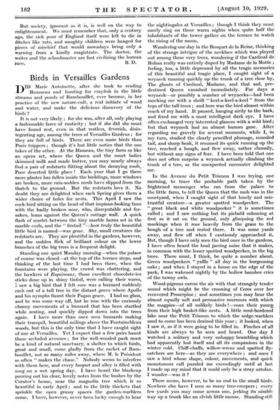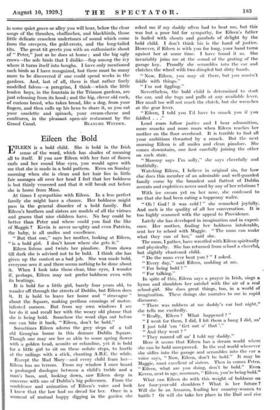Birds in Versailles Gardens
DID Marie Antoinette, after she took to reading Rousseau and hunting for crayfish in the little streams and ponds of Rambouillet, ever become, in her practice of the new nature-cult, a real initiate of wood and water, and make the delicious discovery of the birds ?
It is not very likely ; for she was, after all, only playing a fashionable farce of rusticity ; but if she did she must have found rest, even in that restless, feverish, disin- tegrating age, among the trees of Versailles Gardens ; for they are full of birds. There are even more birds than Paris trippers ; though it's but little notice that the one takes of the other. At the Hameau, the tiny farm so like an opera set, where the Queen and the court ladies skimmed milk and made butter, you may nearly always find a pair of redstarts flitting about the decaying roofs, Poor deserted little place ! Each year that I go there more plaster has fallen inside the buildings, more windows are broken, more rain-sodden reeds have slipped from the thatch to the ground. But the redstarts love it. No doubt they are delighted when each Spring gives them a wider choice of holes for nests. This April I saw the cock-bird sitting on the head of that impious-looking faun with the badly broken nose, who, disreputable and for- saken, leans against the Queen's cottage wall. A quick flash of scarlet between the tiny marble horns set in the marble curls, and the " firetail "—how truly the beautiful little bird is named—was gone. Shy, small creatures the redstarts are. They are plentiful in the gardens, however, and the sudden flick of brilliant colour on the lower branches of the big trees is a frequent delight.
Standing one quiet Monday morning—when the palace of course was closed—at the top of the terrace steps, and thinking of the last time I had been there, when the fountains were playing, the crowd was chattering, and the hawkers of Esquimaux, those excellent chocolate-ice sticks done up in shiny tinfoil, were calling their wares, I saw a big bird that I felt sure was a buzzard suddenly rush out of a tall tree in the distant grove where Apollo and his nymphs flaunt their Pagan grace. I had no glass, and he was some way off, but he rose with the curiously clumsy movements of a buzzard that has been startled while resting, and quickly dipped down into the trees again. I have more than once seen buzzards making their tranquil, beautiful sailings above the Fontainebleau woods, but this is the only time that I have caught sight of one at Versailles. Yet I expect that a few pairs haunt those secluded avenues ; for the well-wooded park must be a kind of natural sanctuary, a shelter to which birds, great and small, come gladly from the racket of Ram- bouillet, not so many miles away, where M. le President so often "makes the chase." Nobody seems to interfere with them here, and every bosquet and alley is filled with song on a wet spring day. I have heard the blackcap pouring out his clear, lovely notes from the bushes by the Curator's house, near the magnolia tree which is so beautiful in early April ; and to the little thickets that sprinkle the open grassy spaces the garden-warblers come. I have, however, never been lucky enough to hear the nightingales at Versailles ; though I think they must surely sing on those warm nights when quite half the inhabitants of the tower gather on the terrace to watch the rising of the moon.
Wandering one day in the Bosquet de la Reine, thinking of the strange intrigue of the necklace which was played out among these very trees, wondering if the Cardinal de Bohan really was entirely duped by Madame de la Motte ; feeling, too, a little depressed by all the tragic memories of this beautiful and tragic place, I caught sight of a wryneck running quickly up the trunk of a tree close by. The ghosts of Cardinal, Madame, and that sad, pre- destined Queen vanished immediately. For days a wryneck—or possibly a number of wrynecks—had been mocking me with a shrill " keel-a-keel-a-keel " from the tops of the tall trees ; and here was the bird almost within reach of my hand. It paused, hanging airily to the bark, and fixed me with a most intelligent dark eye. I have often exchanged very interested glances with a wild bird ; but that wryneck had an almost human gaze. After regarding me gravely for several moments, while I, in my turn, studied the clearly pencilled plumage, rounded tail, and sharp beak, it resumed its quick running up the tree, reached a bough, and flew away, rather clumsily, but without any signs of fear. I have been told that one does not often surprise a wryneck actually climbing the trunk of a tree, so the unexpected encounter delighted me.
In the Avenue du Petit Trianon I was trying, one morning, to trace the probable path taken by the frightened messenger who ran from the palace to the little farm, to tell the Queen that the mob was in the courtyard, when I caught sight of that lonely and mis- trustful creature—a greater spotted woodpecker. The "great black and white woodpecker" it is sometimes called ; and I saw nothing but its piebald colouring at first as it sat on the ground, only glimpsing the red markings when it rose heavily from the grass to the bough of a tree and rested there. It was some yards away, and flew off when I cautiously approached it. But, though I have only seen the bird once in the gardens, I have often heard the loud jarring noise that it makes, in common with the lesser spotted woodpecker, in the big trees. There must, I think, be quite a number about. Green woodpeckers " yaffie " all day in the burgeoning oaks ; and when I stayed in a house on the edge of the park, I was wakened nightly by the hollow banshee cries of the tawny owls.
Wood-pigeons caress the air with that strangely tender sound which might be the crooning of Ceres over her recovered Proserpine ; and sometimes you may hear the almost equally soft and persuasive murmurs with which the magpies—of all unlikely birds !—coax their young from their high basket-like nests. A little reed-bordered lake near the Petit Trianon to which the sedge-warblers used to come has been drained this year ; it looked, when I saw it, as if it were going to be filled in. Finches of all kinds are always to be seen and heard. One day I watched a solitary and very unhappy brambling which had apparently lost itself and all its companions in the winter cold. Chiff-chaffs, willow-wrens and spotted fly- catchers are here—as they are everywhere ; and once I saw a bird whose shape, colour, movements, and quick monotonous call puzzled me exceedingly until at last I made up my mind that it could only be a stray ortolan. I wonder—was it ?
There seems, however, to be no end to the small birds. Nowhere else have I seen so many tree-creepers ; every few yards you may come across one, jerking its nimble way up a trunk like an elvish little mouse. Standing still in some quiet grove or alley you will hear, below the clear songs of the thrushes, chaffinches, and blackbirds, those little delicate ceaseless undertones of sound which come from the creepers, the gold-crests, and the long-tailed tits. The great tit greets you with an enthusiastic shout of "Peter," just as he does at home ; and the big ugly crows—the sole birds that I dislike—flop among the ivy where it turns itself into boughs. I have only mentioned such birds as I have recognized, but there must be many more to be discovered if one could spend weeks in the gardens. And, last of all, there is that rather finely modelled falcon—a peregrine, I think—which the little leaden boys, in the fountain in the Trianon gardens, are just releasing from its hood ; and the big, clever old cock, of curious breed, who takes bread, like a dog, from your fingers, and then calls up his hens to share it, as you eat your omelette and spinach, your cream-cheese and confitures, in the pleasant open-air restaurant by the

































 Previous page
Previous page